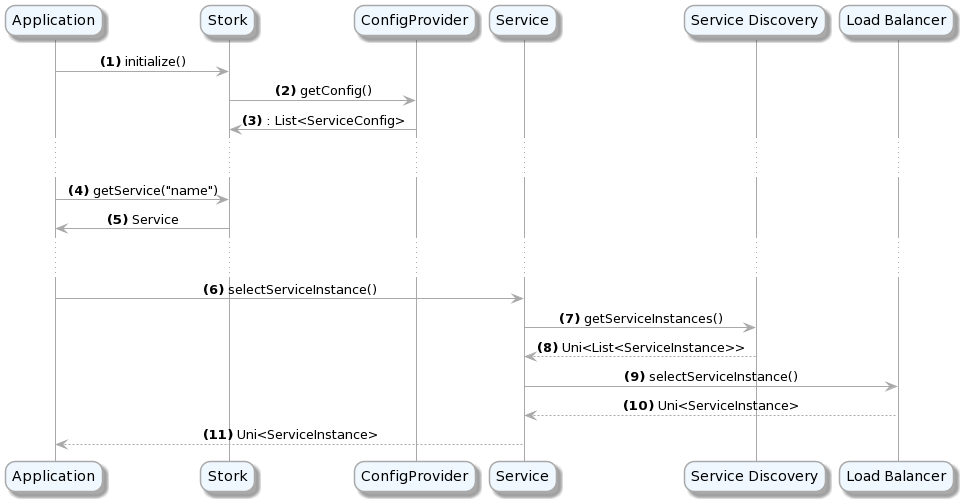Concepts
This page presents the concepts used in Stork. When using Stork in a managed environment, such as Quarkus, all these concepts are hidden, as you only configure the lookup and selection. However, when using the programmatic API, you will use these concepts directly.

Process overview
When using the programmatic API of Stork, you:
- Retrieve the singleton
Storkinstance. This instance is configured with the set ofServiceit manages. - Retrieve the
Serviceyou want to use. EachServiceis associated with a name. - Retrieve the
ServiceInstancewhich will provide the metadata to access the actual service.

Behind the scenes, Stork will handle the service lookup and selection.
Note
The service lookup and selection are asynchronous operations.
Thus, the API returns instances of Uni.
Stork
io.smallrye.stork.Stork is the entry-point of the API.
The Stork instance is a singleton.
It needs to be initialized once (when the application starts) and shutdown when the application stops:
1 2 3 4 5 6 7 8 9 10 11 12 13 14 | |
During the initialization, Stork looks for io.smallrye.stork.config.ConfigProvider SPI provider and retrieves the list of managed services:
- A service is identified by a name.
- A service has a service discovery configuration indicating how Stork will look for service instances
- A service can have a load-balancer configuration indicating how Stork can select the most appropriate instance.
Service
A io.smallrye.stork.Service is the structure representing a service used by the application.
Services are pre-configured with their name, service discovery, and optionally, their load-balancer.
You retrieve a Service using the Stork#getService(String name) method.
1 2 3 4 5 6 7 8 9 10 11 12 13 14 15 16 17 18 | |
The Service lets you retrieve the list of ServiceInstance, or select a single one, when a load-balancer is configured.
Service Instance
The io.smallrye.stork.ServiceInstance represents an actual instance of the service.
It provides the metadata to configure a client to interact with that specific instance of service.
1 2 3 4 5 6 7 8 9 10 11 12 13 14 15 16 17 18 19 20 21 22 23 24 | |
The service selection is a two-steps process:
- Service lookup - using the service discovery
- Service selection - using the load balancer
1 2 3 4 5 6 7 8 9 10 11 12 13 14 15 16 17 18 19 20 21 22 23 24 25 | |
Service Discovery
The io.smallrye.stork.ServiceDiscovery represents a service discovery mechanism, such as DNS, Consul, or Eureka.
You can implement a custom service discovery for Stork by implementing the ServiceDiscoveryProvider
interface and register it with the Service Provider Interface (SPI) mechanism.
Please note that the ServiceDiscovery implementation must be non-blocking.
Load Balancer
The io.smallrye.stork.LoadBalancer represents a load-balancer strategy, such as round-robin.
To implement a custom load balancer for Stork, implement the LoadBalancerProvider
interface and register it with the Service Provider Interface (SPI) mechanism.
Please note that the LoadBalancer implementation, similarly to ServiceDiscovery
must be non-blocking.